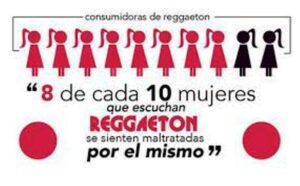Violence, sex and adult language (+ audio and videos).

Ropa de marca, una cadena
La cartera llena y salió pa’ la pista
Lleva la p*¡¿?* en vena
Llega y exagera y anda fuera de vista.
Y cuando se emborracha, hacha
Que rico lo pacha, hacha
Esta pa’ darle brocha, ocha
Está pa’ darle hacha, hacha.

This fragment corresponds to a musical hit that young people consume frequently in cell phones, parties, children’s birthdays; even in public transportation I heard it before, although without paying much attention to it. I declare myself a detractor of certain songs (and note that I didn’t say genres) that today set trends and not precisely because of their artistic quality.
See also: https://www.guiainfantil.com/blog/educacion/valores/el-reggaeton-es-perjudicial-para-el-desarrollo-cognitivo-de-los-ninos/

However, the reflection that I share with you leaves aside my musical tastes to focus on a phenomenon that, brought and brought, despite the efforts dedicated to counteract it, to the constant criticism, threatens not only with its permanence but with its legitimization, now at another level.
See also: https://medium.com/la-tiza/por-una-visi%C3%B3n-dial%C3%A9ctica-del-fen%C3%B3meno-del-reguet%C3%B3n-en-cuba-4558e747e575
Many people were astonished, for better or worse, by the appearance of the topic in question at the Lucasnómetro gala, last September 3rd on Cuban television. It would be unthinkable at other times to bring to the small screen, in prime time, videos where what emerges is not exactly a hymn to gender equality, respect or human dignity.
Hacha, calls for anything but defending the integrity of women. Its author, Bebeshito, a musical reference for most young Cubans today, resorts to a facile approach that, without generalizing, is present in much of urban music, to connect with the public.

He does it from a story that denigrates the female image from macho postures and obscene phrases, offering examples of being one more misogynist in the long list of Cubans and Latin Americans who use the consolidated patriarchal essence of this part of the world (and not only in the urban genre), to climb steps in the preference of his audience. But don’t think that he is the only one or the worst example.
See also: https://magazineampm.com/reinas-cubanas-del-perreo/
In Cuba, it is considered a contravention when a natural or legal person in the use of audiovisual media shows in them contents with: pornography; violence; sexist, vulgar and obscene language; discrimination based on skin color, gender, sexual orientation, disability and any other harmful to human dignity; that threatens the development of children and adolescents; and any other that violates the legal provisions that regulate the normal development of our society in cultural matters.
These conducts are considered very serious, as well as in cases in which music is disseminated or artistic presentations are made in which violence is generated with sexist, vulgar, discriminatory and obscene language.
See also: https://www.telesurtv.net/news/Lanzan-campana-contra-el-machismo-en-el-reggaeton-20150518-0036.html

The messages of reggaeton songs seek to perpetuate gender roles; however, the role of audiences and their active role have re-signified the discourse of this musical genre and this has managed to destabilize it to create new meanings.
But, leaving aside the legal positions, let’s analyze other aspects of the issue. The purest feminist theories defend the enjoyment of women moving their bodies to the rhythm of reggaeton, offensive or not; and I understand this point because I have also danced until I sweat with the genre almost bursting my eardrums. There are even quite a few women who are also into it, although men top the list.
Many will wonder: if there is joy, satisfaction, to what extent does the aggravation occur? It would be necessary to dwell a little more on it, but starting from the point: it is one thing to disassemble the skeleton for fun, whatever the gender in question, and another to commercialize this image at least degraded, manipulated, sexualized.
See also: https://amecopress.net/Reggaeton-Espejo-o-reproductor-de-la-violencia-contra-la-mujer-en-Latinoamerica

From a social and values point of view, this type of music has been strongly criticized for containing messages of violence and rivalry, for normalizing the consumption of drugs and psychoactive substances, for objectifying and sexualizing women, as well as for promoting a hedonistic and empty vision.
This is not and will not be the only or the last musical hit that young people, and even children and not so young people, will listen to. There are for every taste and most of them try to surpass the other in vulgarity, obscenity, objectification of women, sexist language, bad words. Although it should be noted that there are also those who do not resort to these easy ways to stick and offer a letter, at least worthy; but they are the fewest.
See also: https://cubasi.cu/es/cubasi-noticias-cuba-mundo-ultima-hora/item/2463-mas-que-reggaeton-cultura-cubana-%C2%BFusted-que-piensa%3F
Another issue to analyze is that, going back to the beginning, Hacha was in the show responding to a meter of popular taste and, jumping now the dilemma whether it should or should not be televised, the reality that hits us in the face like a punch is that this is the music preferred especially by the youngest, these are the songs that fill the Playlist of their Android or IPOD. And, then, who puts the bell to the cat?
See also: http://ve.scielo.org/scielo.php?script=sci_arttext&pid=S1012-15872008000100006
This is a very complex issue because, with so much musical richness in a country where even stones have rhythm, where internationally renowned composers and instrumentalists of all times come from or live, where genres that are the basis of today’s were born, where have we failed?
It would not be useful now to look for culprits or those responsible; it is rather a trend that would come anyway, sooner or later, especially from social networks, from phone to phone and music sites internationally, now with greater access to these platforms. Nor is it a question of denying the development.
However, it is essential, at this time in which we are, to enhance the presence of traditional Cuban rhythms in the media, the sites that promote national music, to make known by all possible means that extraordinary legacy that reaches our days. To abandon the prejudices that if it is old, it is outdated, it is not liked. In Matanzas we have good examples of young people who retake the musical heritage and return it more contemporary, without losing its essence and I will limit myself to mention two: the juvenile Jazz Band Swing Cubano, directed by maestro Bruno Villalonga and the Failde orchestra.
…ONLINE VIDEO.
And I end with the latter because they have known, from their freshness and fidelity to their roots, how to put our cultural tradition on high; with good taste, talent and respect they demonstrate daily that danzón, mambo, chachachá, bolero, timba and rumba do not get old and that, if we defend it with our hearts, despite their age and ours, music can be fun, exciting and eternal.
ONLINE AUDIO
Written by Jessica Mesa




